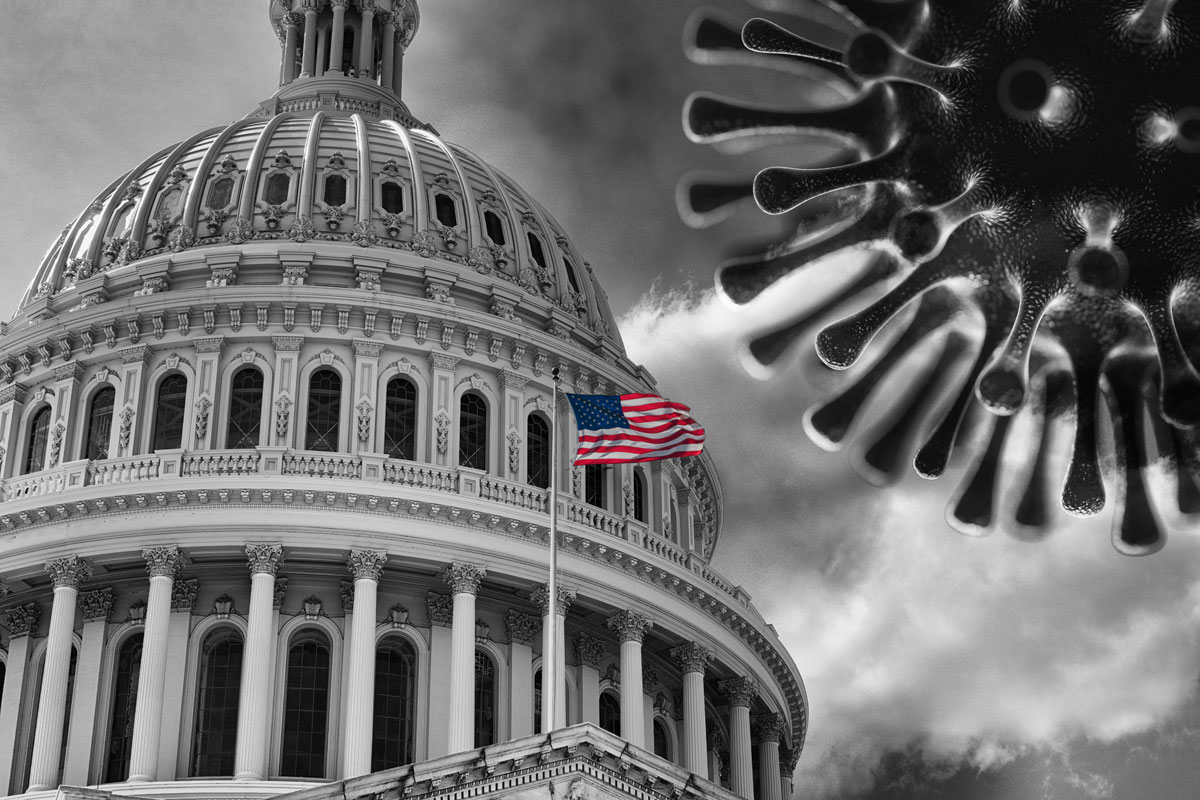On March 27, 2020, President Trump signed a $2 trillion stimulus package known as the Coronavirus Aid, Relief, and Economic Security Act (the “CARES Act” or the “Act”) in response to the economic crisis caused by the coronavirus pandemic (“COVID-19”). The Act provides tax relief on multiple fronts to American families and businesses impacted by COVID-19.
In recent weeks, retirees and workers have watched their individual retirement account (“IRA”) balances drop significantly as global markets have struggled through these unprecedented times. Even more troubling is that an individual who is aged 70½ in 2019 (the “Minimum Distribution Age”) is mandated by law to take a required minimum distribution (“RMD”) from their IRA, SEP IRA, SIMPLE IRA, or defined contribution plan (i.e., a 401(k), a 403(b), or a 457(b) plan) during these volatile market conditions. This requirement places a substantial financial burden on retirees who are forced to sell stocks in their portfolios at reduced prices.
Under the Act, if an individual has attained the Minimum Distribution Age, then their RMD payment is waived for 2020. This relief also applies to individuals who reached the Minimum Distribution Age in 2019 and have elected to defer their initial distribution to April 1, 2020. It also applies to an RMD payment from an inherited IRA. Traditionally, once an individual reaches the Minimum Distribution Age, the deadline for taking their first RMD payment is April 1st of the following year. For each year thereafter, the deadline is December 31st of the current distribution year. If an individual has already taken an RMD payment for 2020, then he or she is still eligible to obtain relief if the RMD payment is re-deposited within sixty (60) days of its distribution date. Investment advisors and economists remain hopeful that waiving the RMD payment for 2020 will provide retirees additional time to recover any losses sustained due to COVID-19.
In addition, the Act allows for a penalty-free withdrawal from an IRA or a defined contribution plan of up to $100,000 for an individual who has not attained the age of 59 ½ years (the “Minimum Withdrawal Age”) and has experienced financial hardship related to COVID-19. Typically, the IRS imposes a 10 percent penalty on individuals who receive withdrawals from an IRA or a defined contribution plan prior to reaching the Minimum Withdrawal Age (the “Early Withdrawal Penalty”). If an individual receives a COVID-19-related withdrawal, the Early Withdrawal Penalty is waived. A “COVID-19-related withdrawal” is a withdrawal made by an individual for any of the following reasons: (i) the individual, or their spouse or dependent, has been diagnosed with COVID-19 by a test approved by the CDC; (ii) the individual experiences adverse financial consequences as a result of being quarantined, furloughed, or laid off, or their work hours have been reduced; (iii) the individual is unable to work due to lack of child care as a result of COVID-19; (iv) the individual has had to close or reduce the hours of their business as a result of COVID-19; or (v) the individual has been impacted by other factors as determined by the Secretary of the Treasury. A COVID-19-related withdrawal is subject to tax at ordinary income rates, but may be included in income over a three-year period. In order to avoid such taxation, a COVID-19-related withdrawal may be recontributed over a three-year period to the plan from which it was withdrawn, or to another qualified plan, and such recontribution will not be counted towards the individual’s annual contribution limits.
In 2017, tax reform legislation known as the Tax Cuts and Jobs Act (the “TCJA”) was enacted, which nearly doubled the standard deduction for individuals but reduced the number of taxpayers claiming an itemized deduction for charitable contribution donations. Under the Act, an individual can claim an above-the-line charitable contribution deduction for calendar year 2020 of up to $300. An “above-the-line” deduction reduces a taxpayer’s gross income to determine their adjusted gross income, commonly referred to as “AGI.” Examples of above-the-line deductions include student loan interest, moving expenses and alimony payments. Donations made to donor-advised funds or to private foundations do not qualify for this deduction.
Taxpayers in the retail, restaurant, and hospitality industries may be eligible to receive immediate cash flow benefits under the Act which fixed a technical error, known as the “retail glitch,” under the TCJA. The Act qualifies certain interior improvements made to nonresidential real property (hereinafter, “Qualified Improvement Property” or “QIP”) for bonus depreciation. QIP is any improvement to an interior portion of a building that is nonresidential real property after the date the building is placed in service. It does not include expenditures for the enlargement of a building, elevators or escalators, or the internal structural framework of a building. Under the TCJA, bonus depreciation rules were expanded to provide a 100% write-off of certain property with a cost recovery period of 20 years or less. QIP, such as qualified leasehold improvements, qualified restaurant property, and qualified retail improvement property, were assigned a cost recovery period of 39 years. Under the Act, the cost recovery period for QIP is adjusted from 39 years to 15 years to allow taxpayers to claim bonus depreciation. A taxpayer may claim tax benefits of bonus depreciation retroactively for QIP placed in service during 2018 or 2019 by filing an amended return.
In response to COVID-19, the IRS has provided individual and corporate taxpayers administrative grace by extending the deadline to file federal income tax returns and to remit payment of tax. The deadline has been extended from April 15, 2020 to July 15, 2020. This extension is automatic and applies to individuals, trusts, and corporations, and for taxpayers whose estimated tax payments for 2020 is due on April 15, 2020. Any penalty, interest, or addition to tax for a failure to file or a failure to pay will not accrue until July 16, 2020.
The CARES Act is intended to provide immediate tax relief for individuals and businesses. For more information on other forms of tax relief provided under the CARES Act, please click here.


